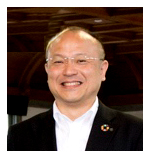Dialogue
Resolving Social Issues of the Local Community
- Efforts on Invigorating the Local Community and Protecting the Environment

Social Issues of the Local Community and Solutions
- Facilitator:
So far, we have talked about the biomass business of Maniwa City and environment management at NTT West Group. Next, I would like to ask Mr. Ota about the challenges faced by Maniwa City.
- Ota:
 First of all, it is important that we slow down the declining trend in the population, so a major challenge will be to develop an environment where people can lead a safe, secure and enriched life in this rural area, and to establish a sustainable and prosperous local community. Named "Materializing the Maniwa Lifestyle," we hope to make the best use of the resources available only in Maniwa and not in big cities to build an affluent life that is unique to Maniwa.
First of all, it is important that we slow down the declining trend in the population, so a major challenge will be to develop an environment where people can lead a safe, secure and enriched life in this rural area, and to establish a sustainable and prosperous local community. Named "Materializing the Maniwa Lifestyle," we hope to make the best use of the resources available only in Maniwa and not in big cities to build an affluent life that is unique to Maniwa.
Recently, the first round of "selection of Sustainable Development Goals (SDGs) Future Cities" was conducted, which shortlisted 29 groups including Maniwa City as well as Okayama City of Okayama Prefecture. Sustainable Development Goals (SDGs) consist of 17 development goals for the international society, including developed nations, which are adopted at the United Nations (UN) summit in September 2015 and to be achieved by 2030. By following these goals, we aim to build a sustainable and prosperous community.
Besides engaging in the SDGs efforts, it is also ideal to develop a major grassroots movement based on the combined effort of the citizens and private sector, rather than having the government play the central role in disseminating the information.
Just now, I mentioned about "satoyama capitalism." We hope to find an effective way to connect "satoyama capitalism on a macro scale" that has an impact on the entire economy or region of the city, such as biomass power generation, with "satoyama resources on a micro scale" that can be produced by each smaller region.
The respective regions are currently advancing efforts in this direction. One of the examples is the purchase of a "gibier (*) car" that allows gibier dishes to be prepared inside the vehicle and to manufacture canned gibier food in the premises of a closed-down junior high school.
Other endeavors include manufacturing of soap using natural ingredients and craft beer.
- *"Gibier" is a French word which refers to natural wild game meat. It is a food culture that has developed since ancient times as a traditional cuisine of European nobility. (Source: Japan Gibier Promotion Association)
- Facilitator:
Mr. Nishitani, regarding the different challenges faced by the rural regions, such as declining population and longer life expectancy, is there anything that only NTT West can offer to resolve the issues?
- Nishitani:
 Here in Maniwa City, we offer our support by building the "Maniwa Hikari Network." In 2014, we signed a comprehensive partnership agreement on the introduction of information technology, which also includes the plan to utilize ICT in tourism, transportation and disaster prevention. We will also build an adequate cooperative system to prepare for major disasters.
Here in Maniwa City, we offer our support by building the "Maniwa Hikari Network." In 2014, we signed a comprehensive partnership agreement on the introduction of information technology, which also includes the plan to utilize ICT in tourism, transportation and disaster prevention. We will also build an adequate cooperative system to prepare for major disasters.
Just now, we heard about the SDGs initiatives from Mr. Ota. At NTT West Group, we also share the same understanding that our efforts to resolve social issues will eventually help to achieve the SDGs, and we have also incorporated them as part of our CSR.
In particular, we try to incorporate social issues with ICT to build a society that is safer and secure where people, goods and regions are connected using IoT and big data, or one that is affluent and fosters innovation.
In the timber industry, for example, "animal damages" such as deer eating the bark of trees are causing trees to wither. As a measure to counter this problem, we offer an ICT system that is able to remotely detect information such as the movement and location of deer and get rid of them using a sensor and a cage.
We hope that our ICT can be made use of to resolve the issues more efficiently.
- Facilitator:
Both NTT West and the local government bodies are engaging in SDGs efforts in different regions. Can you tell us more about the ICT solution services introduced by NTT West to address environmental issues?
- Hara:
Since 2009, we have implemented a system to certify and award a "Solution Environment Label" for "environment-friendly solutions" among the ICT solutions offered by the different NTT Group companies that can be expected to achieve a certain degree of effect in reducing the environmental load. For example, offering a telework solution helps to cut down on the amount of travel needed by our customers, thereby contributing to the reduction of CO2 emission. NTT West Group also recommends such a system that proactively awards a label to solutions that can be expected to reduce the environmental load of the society.
If we were to raise an SDGs example from last year, we endorsed a remote maintenance and inspection service for solar panels and is encouraging its widespread adoption.
- Ota:
Indeed, periodic maintenance and inspection such as cleaning is necessary for solar panels. Otherwise, they might deteriorate in efficiency or stop functioning.
- Hara:
 Power cannot be generated if they stop working, and the opportunity to generate electric power will be lost if we do not tackle the issue quickly. By being able to remotely monitor solar panels installed at a distant location, we can identify issues and resolve them immediately.
Power cannot be generated if they stop working, and the opportunity to generate electric power will be lost if we do not tackle the issue quickly. By being able to remotely monitor solar panels installed at a distant location, we can identify issues and resolve them immediately.
- Nishitani:
By combining solutions and ICT with social issues or issues faced by individual companies, we can apply them to reduce the environmental load in many different ways. Every company within NTT West Group is also racking its brain to think about what to combine the Solution Environment Label with. To achieve this, we will need to make persistent efforts to listen proactively to what our customers have to say and grasp the issues.
- Ota:
We have also built a system using the ICT of Ministry of Internal Affairs and Communications to grasp the actual conditions of the mountains. For example, we make use of a drone to capture photos of the mountains and integrate them as part of the map information. By doing so, we can get things done simply through data correspondence, which eliminates the need to travel such as when we submit an application for lumbering in the forest. This is truly a paperless and speedy process. This system that makes use of ICT specially designed for forests is called the "Maniwa Model" and is widely employed throughout Japan.
- Nishitani:
This concept would not have emerged with drone alone. Since drone is a machine, we have to think about what we can do using it and put the ideas into practice. I believe eco-friendly results are produced when all these ideas are connected.
- Facilitator:
Lastly, please share with us what you think regarding the dialog session today.
- Nishitani:
While I always have the opportunity to talk to Mr. Ota, I learned about the different endeavors of Maniwa City today and was able to discover new appealing aspects of the city. Now I have a renewed determination to learn even more about Maniwa City.
- Ota:
I am impressed by and identify with NTT West Group's full utilization of ICT and knowledge you have accumulated to resolve social issues and other issues related to disasters in the local community. As a government body, we sincerely hope to receive your support and learn from you in a good way in future.
- Facilitator:
Thank you for your time today.
[Profile of Dialog Participants]
 |
Noboru Ota Mayor of Maniwa City, Okayama Prefecture After joining Kyoto Prefectural Office, he took up the posts as Head of Mayor's Office, General Affairs Department Manager and Deputy Governor of Kyoto Prefecture before assuming the current position since April 2013. Hobbies: Studying regional history and travelling to different places Motto: 窶廬f the local people are delighted with your government, many people will come from far away窶 (Confucius) |
 |
Norihiko Nishitani Nippon Telegraph and Telephone West Corporation, Manager of Okayama Branch and Deputy General Manager of Chugoku Regional Headquarters |
 |
Mieko Hara Nippon Telegraph and Telephone West Corporation, Technology Innovation Department, Environmental Management Promotion Office Manager |


